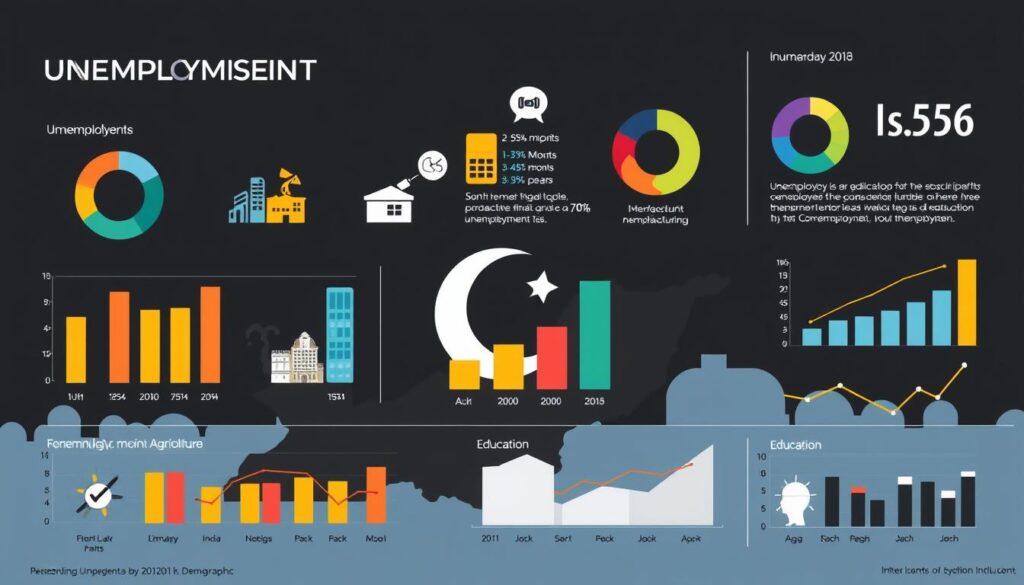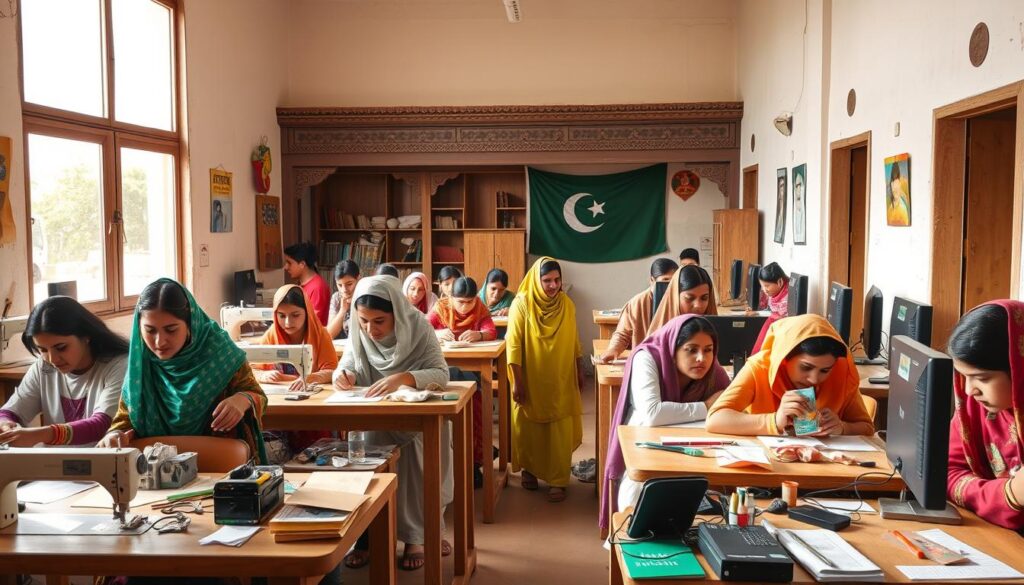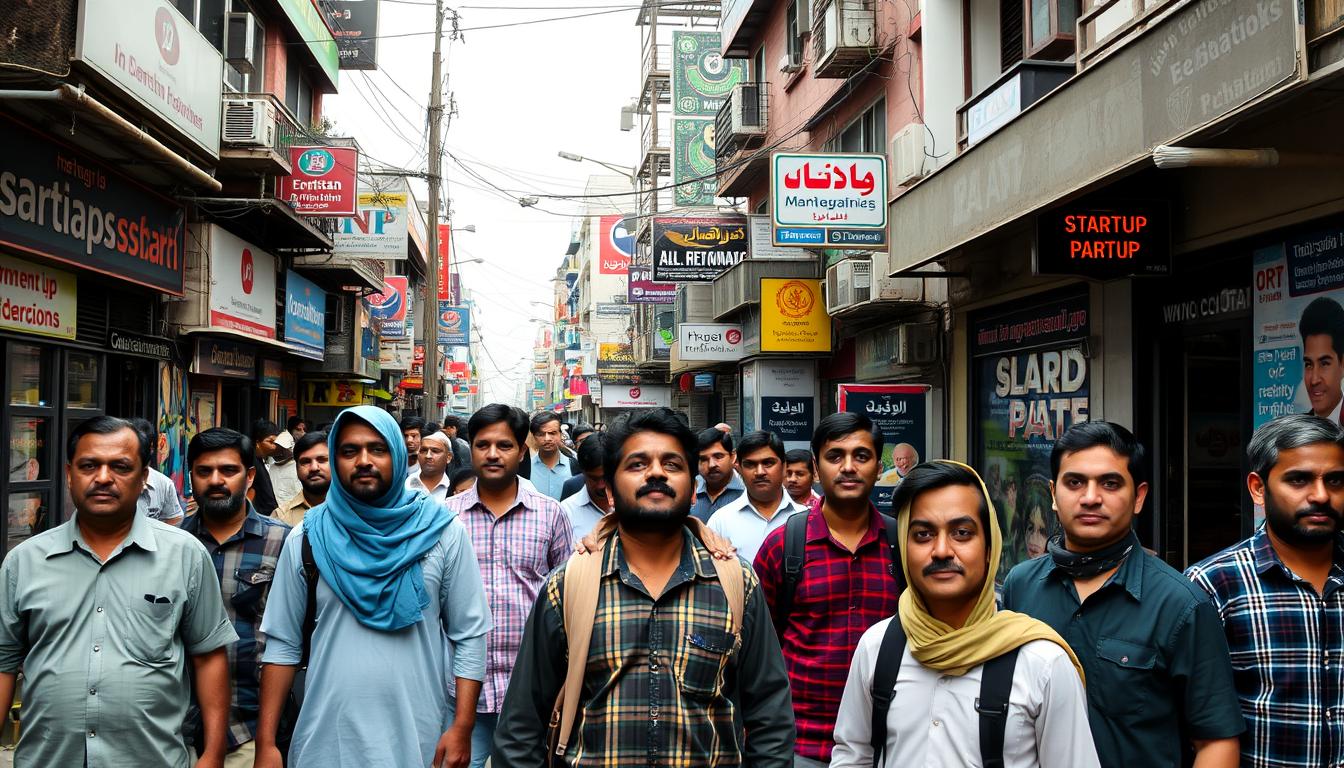Unemployment in Pakistan is a major problem. The jobless rate is as high as 6.9% as of 2022. This has led to more poverty, social unrest, and a bigger gap in equality.
Old ways to solve unemployment, like government jobs and vocational training, haven’t worked well. But, a new group of startups in Pakistan is showing promise. They might help solve this big issue.
Key Takeaways
- Pakistan is facing a severe unemployment crisis with a jobless rate of 6.9%.
- The crisis has led to increased poverty, social unrest, and a widening of the inequality gap.
- Traditional approaches have had limited success in addressing the root causes.
- Innovative startups are emerging as a potential solution to tackle the unemployment crisis.
- Startups are leveraging technology and new business models to create job opportunities.
The Unemployment Crisis in Pakistan
Pakistan is facing a severe unemployment crisis. The latest data from the Pakistan Bureau of Statistics shows an unemployment rate of 6.9% as of 2022. This issue is especially hard on the youth and in rural areas, where job opportunities are scarce.
Staggering Statistics and Socio-Economic Impact
The unemployment crisis in Pakistan has led to more poverty, social unrest, and a bigger inequality gap. Many educated and skilled people can’t find jobs. This makes the problem worse and slows down economic growth.
- According to the Pakistan Bureau of Statistics, the unemployment rate in Pakistan stands at 6.9% as of 2022.
- The highest unemployment rates are found among the youth and in rural areas.
- The lack of job opportunities has led to a situation where many educated and skilled individuals are unable to find employment.
“The unemployment crisis in Pakistan has had a devastating impact on the country’s socio-economic landscape, contributing to increased poverty, social unrest, and widening inequality.”
The economic impact of unemployment in Pakistan is huge. The social impact is felt by many people. It’s important to tackle this crisis to help reduce poverty and promote equality in the country.

Traditional Approaches: Limitations and Challenges
The Pakistani government has tried to solve unemployment with government job programs and vocational training initiatives. But these old ways haven’t worked well. There’s a big gap between what workers can do and what jobs need. Also, the public and private sectors don’t work together well.
Vocational training often doesn’t match what employers want. This leaves graduates without jobs. These programs also don’t reach everyone, especially in rural areas. This makes the unemployment problem worse.
“The traditional job creation programs have become outdated and fail to address the dynamic nature of the job market. We need to rethink our approach and focus on more innovative and sustainable solutions.”
The government and private sector don’t talk enough. This leads to a problem where there aren’t enough skilled workers. The private sector says it’s hard to find good people. But the government’s vocational training initiatives pakistan can’t always meet their needs.
We need a new way to work together. We must make sure schools, training programs, and jobs all match up. Then, the government job programs pakistan can really help solve unemployment and give young people real jobs.

Startup Ecosystem: A Breeding Ground for Innovation
In recent years, the startup ecosystem in Pakistan has become a hub for new ideas. Entrepreneurs and innovators are using technology to create jobs. The Pakistani government is also supporting startups with various initiatives.
Government Initiatives and Support Structures
The government is helping the startup ecosystem in Pakistan grow. It has set up technology parks, incubators, and accelerators. These places give innovative startups the tools they need to succeed.
- Technology parks offer top-notch facilities for startups to work together and share knowledge.
- Incubators and accelerators provide training, networking, and investor connections to help startups grow.
- The government also gives startups tax breaks and funding to encourage growth.
Thanks to these government support structures for startups in Pakistan, a vibrant ecosystem has emerged. This ecosystem is tackling unemployment and boosting the economy.

“The startup ecosystem in Pakistan shows the creativity and determination of our youth. With the right support, these innovative startups can change the job market and drive growth.”
Unemployment in Pakistan: Addressing the Root Causes
To tackle Pakistan’s unemployment, we must tackle the root causes. This means making economic reforms, improving education, and encouraging entrepreneurship. These steps will help create jobs and boost the economy.
Pakistan’s economy is too narrow, relying on a few industries. The government needs to diversify by supporting new sectors and attracting foreign investment. This will help small and medium-sized businesses grow.
- Diversify the economy by investing in emerging sectors such as technology, renewable energy, and tourism.
- Streamline regulations and bureaucratic processes to create a more business-friendly environment.
- Provide incentives and support for SMEs to thrive and create more job opportunities.
The education system in Pakistan doesn’t match the job market. It often doesn’t prepare graduates for what employers need. The government should work with businesses to update the curriculum and improve vocational training.
“The key to reducing unemployment in Pakistan lies in addressing the root causes through comprehensive economic reforms and aligning the education system with the job market.”
Encouraging entrepreneurship and innovation is also key. The government should offer support and incentives for startups. This will help the tech sector grow and create jobs.

By tackling these root causes, Pakistan can make big strides in solving unemployment. This will lead to a brighter, more prosperous future for everyone.
Skills Development and Vocational Training
In Pakistan, tackling the education employment gap is key to solving the unemployment problem. Focusing on skills development and vocational training is a major strategy. These efforts aim to link education with the job market, giving workers the skills needed by employers.
Vocational training institutes in Pakistan offer practical, industry-specific programs. These programs cover technical skills in areas like construction, manufacturing, and IT. They also include entrepreneurial and soft skills, helping learners become more employable and contribute to industry growth.
Bridging the Gap between Education and Employment
The education employment gap in Pakistan is a big challenge. It can be solved by integrating skills development and vocational training into education. By matching curriculums with industry needs, these programs prepare graduates for the workforce.
- Collaborative efforts between schools, government, and the private sector are key in creating effective vocational training pakistan programs.
- Apprenticeships and internships give learners real-world experience. They help apply skills in actual settings and gain industry exposure.
- Adding career counseling and job placement services boosts skills development pakistan efforts. It guides individuals towards lasting jobs.
Investing in skills development pakistan and vocational training pakistan helps bridge the education and employment gap. It empowers the youth and drives economic growth.
Digital Transformation and E-Commerce Opportunities
Pakistan is on the verge of a digital revolution. The e-commerce sector is growing fast, offering many job opportunities. Startups and businesses are using new technologies to create innovative digital solutions. This is helping to create jobs and boost the economy.
The digital transformation in Pakistan has sped up because of COVID-19. More people and businesses are using online shopping. This has led to a big need for skilled workers in web development, digital marketing, and logistics. These jobs are creating new chances in the tech industry.
The government is also supporting the e-commerce opportunities in Pakistan. They have created policies and councils to help the sector grow. Startups are using these chances to develop new digital solutions. They are reaching more customers both at home and abroad.
“The digital transformation in Pakistan has unlocked a wealth of opportunities for entrepreneurs and job seekers alike. By embracing technology and the e-commerce revolution, we can drive economic growth and create a more prosperous future for our nation.”
As Pakistan moves forward with digital transformation, technology, e-commerce, and entrepreneurship are key. They will help solve the unemployment crisis and support sustainable economic growth.
Social Entrepreneurship: Creating Sustainable Livelihoods
In Pakistan, social entrepreneurship is a big help in solving the job crisis. Startups and social businesses are making jobs and helping poor areas. They show how social entrepreneurship can help people and communities stand on their own.
Success Stories and Inspiring Journeys
Roshni Rides is a great example. It offers safe transport for women in cities. Started by young entrepreneurs, it has given jobs and helped women reach schools, hospitals, and jobs they couldn’t before.
Saba Gul’s Popinjay is another success. It teaches women in rural areas to make crafts and gives them jobs. Popinjay shows how social business can improve lives and help poor areas.
“Social entrepreneurship is not just about creating profitable businesses; it’s about transforming lives and building a more equitable society.”
These startup success stories pakistan show the power of social entrepreneurship pakistan. They tackle unemployment and grow the economy in a green way. These startups are leading to a brighter future for everyone in Pakistan.
Challenges and Roadblocks for Startups
The startup scene in Pakistan is growing fast, aiming to solve the job crisis. Yet, startups hit many challenges and roadblocks. They struggle with funding, rules, infrastructure, and finding skilled workers. Working together, the government, private sector, and startups can unlock Pakistan’s innovation and job creation potential.
Finding money is a big challenge startups pakistan face. Young entrepreneurs find it hard to get the funds needed to start and grow. A weak venture capital scene and strict lending rules make it tough for them to get the resources they need.
Roadblocks startups pakistan hit include tough rules that slow their growth. Bureaucracy, old laws, and unclear rules make it hard for startups to focus on their business.
- Bad infrastructure, like power, internet, and transport, also hinders startups’ daily work.
- Finding skilled workers, especially in tech and management, is another big problem for startups.
“Addressing the challenges startups pakistan face is crucial to unlocking the true potential of entrepreneurship and driving economic growth in the country.”
To beat these obstacles entrepreneurship pakistan, everyone needs to work together. The government should make rules easier, boost funding, and improve infrastructure. Startups should form partnerships, get mentorship, and train their teams to tackle these issues.
By tackling these roadblocks startups pakistan and creating a better environment for startups, Pakistan can use its innovative spirit to solve the job crisis and grow its economy.
Collaborative Efforts: Fostering Partnerships and Investments
To tackle Pakistan’s job crisis, we need to work together. By joining forces, the public and private sectors can help startups grow. This way, they can create more jobs.
The startup scene in Pakistan is full of promise. But, we need to team up to make the most of it. With government help and startup creativity, we can boost jobs and the economy.
“Collaborative efforts that bring together the government, private sector, and startup community are crucial in tackling the unemployment challenge in Pakistan,” shares industry expert, Saira Khan.
When we pool our strengths, startups can do more. They can reach more people with their new ideas. By building a strong partnership network, Pakistan can empower its youth and drive economic change.
Also, we need to bring in more investors. Angel investors and venture capitalists can give startups the money and advice they need. This helps them grow and create jobs.
The key to Pakistan’s job future is teamwork. By working together, we can unlock the startup ecosystem’s full potential. This way, we can solve the job crisis for good.
The Way Forward: Empowering Youth and Driving Economic Growth
To tackle Pakistan’s unemployment crisis, a broad strategy is needed. This includes training the youth, supporting entrepreneurs, and encouraging innovation. By tapping into the startup world and working together, Pakistan can create more jobs, reduce poverty, and lead in innovation.
Empowering Pakistan’s youth is key. They have a huge potential waiting to be tapped. Skills training and vocational education can prepare them for the job market. Also, supporting startups can help diversify the economy and create lasting jobs.
The government of Pakistan must also improve its support for businesses. This means making rules easier, helping with funding, and partnering with the private sector and global organizations. By focusing on economic growth and social welfare, Pakistan can use its young people to bring about prosperity and inclusive growth.
- The Unemployment Crisis in Pakistan
- Traditional Approaches: Limitations and Challenges
- Startup Ecosystem: A Breeding Ground for Innovation
- Unemployment in Pakistan: Addressing the Root Causes
- Skills Development and Vocational Training
- Digital Transformation and E-Commerce Opportunities
- Social Entrepreneurship: Creating Sustainable Livelihoods
- Challenges and Roadblocks for Startups
- Collaborative Efforts: Fostering Partnerships and Investments
- The Way Forward: Empowering Youth and Driving Economic Growth
